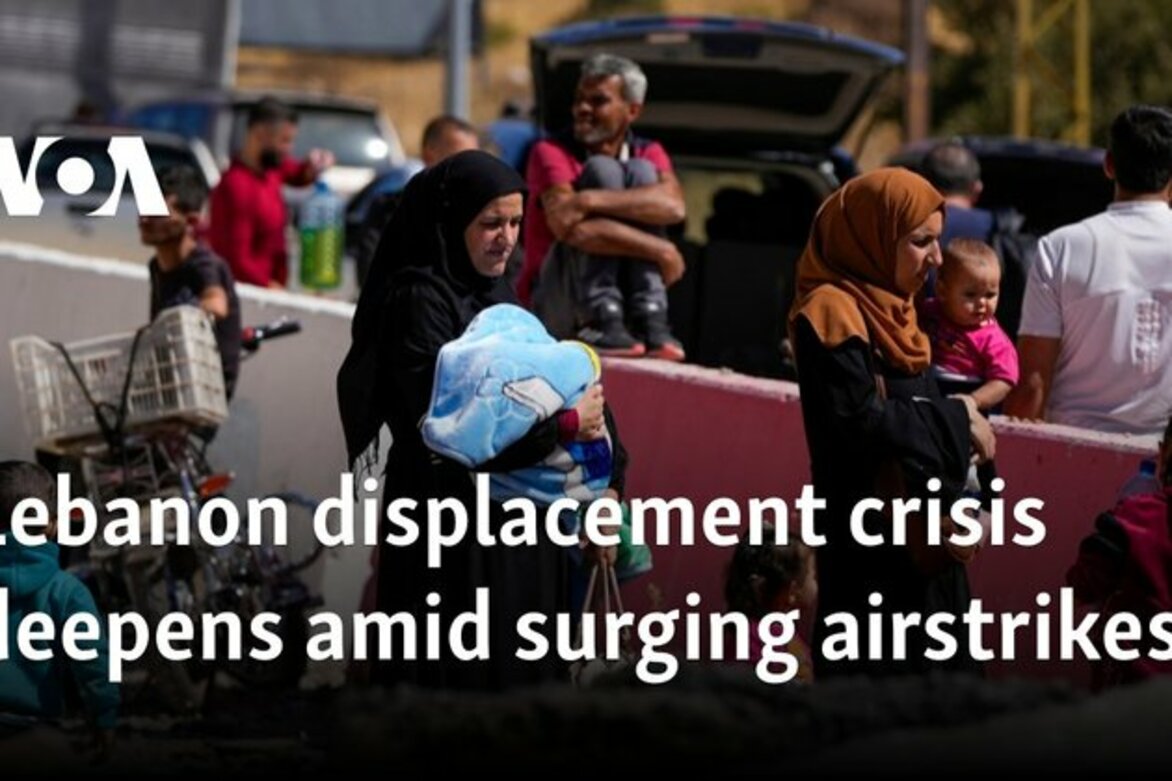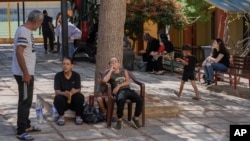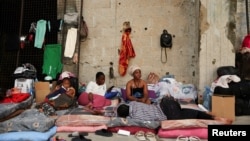Lebanon displacement crisis deepens amid surging airstrikes
Voice of America
05 Oct 2024

geneva - The United Nations warns Lebanon's displacement crisis is deepening as aid agencies scramble to protect and assist tens of thousands of people fleeing for safety. The warning was made amid a surge in airstrikes as Israel's "limited, localized and targeted" operation against Hezbollah militants intensifies in scale and scope.
"As the humanitarian situation deteriorates, UNHCR is reinforcing supplies of core relief items to meet increasing needs and prepare for further escalation, said Rula Amin, the U.N. refugee agency's senior communications advisor for the Middle East and North Africa.
Speaking from the Jordanian capital, Amman, she told journalists in Geneva Friday that "the volatile security situation and ongoing Israeli airstrikes are delaying relief supplies," noting that an airlift carrying life-saving medical trauma kits and a shipment of over 20,000 thermal blankets was delayed.
The Lebanese government estimates a million people have become displaced inside the country since Hamas militants attacked Israel on October 7, 2023, and war broke out in Gaza.
According to the International Organization for Migration (IOM), 400,000 people have become displaced in the last two weeks. Of those, more than 165,000 are living in 800 collective shelters across the country.
"These are schools that the government has urgently opened," Mathieu Luciano, the IOM's head of office in Lebanon said.
Speaking on a video link from Beirut, he said, "The situation is really deteriorating rapidly. Hundreds of thousands of people have been forced to flee their homes in the past two weeks. The roads are jammed with traffic. People are sleeping in public parks, on the street and the beach."
He said the numbers of displaced "continue to rise as heavy shelling continues in the South, in the Beqaa, in Beirut and other regions in the country. In addition to internal displacement, tens of thousands of Lebanese, but also Syrians, are leaving the country," both through legal and irregular means."
The Syrian Arab Red Crescent says more than 185,000 people have fled to Syria. That number has markedly decreased since an Israeli airstrike Friday cut off vehicle access at the key Masnaa border crossing.
"A huge crater was created in the no man's land between the Syrian and the Lebanese side, so it is very hard for vehicles, for people to go through this crossing," the UNHCRs Amin said, adding that some people, "determined to flee crossed on foot."
Israel said it targeted the border crossing with Syria to stop Hezbollah "from smuggling weapons into Lebanon."

Despite the complexities, Amin said that Syrian authorities are keeping the border open as people continue to flee from Lebanon to Syria through Masnaa and three other border points.
She observed that Syrian refugees are faced with the difficult decision of returning to the country they fled throughout the past 13 years or staying in Lebanon.
"Due to the bombings, lack of adequate shelters, lack of access to services," she said, the Syrian refugees have to choose whether "to stay in Lebanon with the growing risk on their life, or to go back and cross the border to Syria with all the other risks in mind."
"It seems from the numbers of people we have been seeing is that at this point they felt that the risks from the bombings is high" and they are going back, said Amin.
"Some 60% of new arrivals are children and adolescents. Some of the children have arrived on their own, without family members," she said. "As they flee the bombings, families arrive with profound emotional fatigue, some requiring urgent medical care. The majority of new arrivals head to their towns and villages of origin to join relatives."
In its daily update on the humanitarian crisis in Lebanon, the Office for the Coordination of Humanitarian Affairs, OCHA, says over the past two weeks, "conflict related deaths have increased by more than 200% to 1,699, with more than 9,781 injuries.
At the same time, UNICEF says that more than 690 children have been injured in Lebanon "as the conflict has dramatically escalated in recent weeks."
Aid agencies are scaling up their humanitarian operations to provide shelter for the homeless, food for the hungry and medical care for the sick and injured. The UNHCR and SARC are supporting authorities in transporting thousands of the most vulnerable from the borders to their final destinations.
"But the suffering of those who cross does not end at the border," Amin stressed. "After 13 years of crisis, many are going back to destroyed homes, damaged infrastructure and crippled basic services. They have arrived with no resources for their basic needs.
"Inside Syria, there are still more than 7.2 million people displaced internally and the country is going through a deep economic crisis."
IOM official Luciano said his agency has scaled up immediate lifesaving assistance, providing essential relief items as well as protection services and health support to the IDPs.

He highlighted the plight of Lebanon's 180,000 immigrant workers, many of whom are female domestic workers, coming from Ethiopia, Sri Lanka, Kenya, Sudan, Bangladesh and the Philippines. "They have been deeply affected by violence in the country," he said.
"We are receiving increasing reports of migrant domestic workers being abandoned by their Lebanese employer, either left on the streets or in the homes," he said. "We have received increased requests from migrants seeking assistance to return home, and from several member states to help evacuate their citizens from Lebanon."
"This will require significant funding, which we currently do not have," he said, noting that the IOM is appealing for $32.46 million to assist 400,000 people affected by the crisis over the next three months.
That is apart from the U.N.'s inter-agency flash appeal for nearly $426 million to deliver lifesaving assistance to more than 1 million people directly affected and/or displaced by the crisis in Lebanon.
